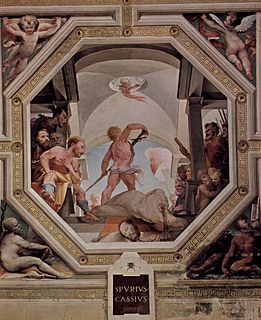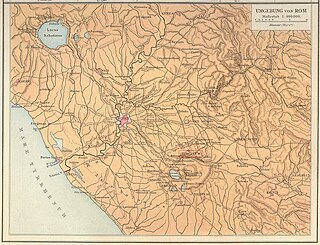Related Research Articles

Publius Horatius Cocles was an officer in the army of the early Roman Republic who famously defended the Pons Sublicius from the invading army of Etruscan King Lars Porsena of Clusium in the late 6th century BC, during the war between Rome and Clusium. By defending the narrow end of the bridge, he and his companions were able to hold off the attacking army long enough to allow other Romans to destroy the bridge behind him, blocking the Etruscans' advance and saving the city.

Spurius Cassius Vecellinus or Vicellinus was one of the most distinguished men of the early Roman Republic. He was three times consul, and celebrated two triumphs. He was the first magister equitum, and the author of the first agrarian law. The year following his last consulship, he was accused of aiming at regal power, and was put to death by the patricians.
Titus Larcius was a Roman general and statesman during the early Republic, who served twice as consul and became the first Roman dictator.

The Battle of Mount Algidus was fought in 458 BC, between the Roman Republic and the Aequi, near Mount Algidus in Latium. The Roman dictator Lucius Quinctius Cincinnatus turned an expected Roman defeat into an important victory.

The gens Cloelia, originally Cluilia, and occasionally written Clouilia or Cloulia, was a patrician family at ancient Rome. The gens was prominent throughout the period of the Republic. The first of the Cloelii to hold the consulship was Quintus Cloelius Siculus, in 498 BC.
The gens Lartia, also spelled Larcia, or rarely Largia, was a patrician family at ancient Rome, whose members earned great distinction at the beginning of the Republic. Spurius Larcius was one of the two companions of Horatius, who defended the Pons Sublicius against Lars Porsena in 508 BC. A few years later, Titus Larcius became the first Roman dictator. However, the gens all but vanishes from history after this period. A family of the same name existed in the late Republic and under the early Empire, but their relationship to the earlier Lartii is unknown.
Spurius Larcius was one of the leading men of the early Roman Republic, of which he was twice consul. However, his greatest fame was won as one of the defenders of the Sublician bridge against the army of Lars Porsena, the King of Clusium.

Titus Herminius, surnamed Aquilinus, was one of the heroes of the Roman Republic. He participated in two of the most famous conflicts that attended the birth of the Republic, and was elected consul in 506 BC. However, his greatest fame was won as one of the defenders of the Sublician bridge against the army of Lars Porsena, the King of Clusium.
The gens Verginia or Virginia was a prominent family at ancient Rome, which from an early period was divided into patrician and plebeian branches. The gens was of great antiquity, and frequently filled the highest honors of the state during the early years of the Republic. The first of the family who obtained the consulship was Opiter Verginius Tricostus in 502 BC, the seventh year of the Republic. The plebeian members of the family were also numbered amongst the early tribunes of the people.

The gens Lucretia was a prominent family of the Roman Republic. Originally patrician, the gens later included a number of plebeian families. The Lucretii were one of the most ancient gentes, and the second wife of Numa Pompilius, the second King of Rome, was named Lucretia. The first of the Lucretii to obtain the consulship was Spurius Lucretius Tricipitinus in 509 BC, the first year of the Republic.
Postumus Cominius Auruncus was a two-time consul of the early Roman Republic.
Titus Cloelius Siculus was a Roman statesman of the early Republic, and one of the first consular tribunes in 444 BC. He was compelled to abdicate after a fault was found during his election. Two years later he was one of the founders of the colony of Ardea.
GaiusVeturius Geminus Cicurinus was a Roman Republican politician during the beginning of the 5th century BC. He served as Consul of Rome in 499 BC together with Titus Aebutius Helva. He was a member of the patrician class and of the Veturia gens.
Aulus Sempronius Atratinus was a Roman Republican politician during the beginning of the 5th century BC. He served as Consul of Rome in 497 BC and again in 491 BC. He was of the patrician branch of his gens although the Sempronia gens also included certain plebeian families.
The gens Duilia or Duillia was a plebeian family at ancient Rome. The first of the gens to achieve prominence was Marcus Duilius, tribune of the plebs in BC 470. The family produced several important statesmen over the first three centuries of the Republic, before fading into obscurity.
Aulus Verginius Tricostus Caeliomontanus was a Roman Republican politician and general of the gens Verginia. He served as a Roman consul in 494 BC together with Titus Veturius Geminus Cicurinus.
Titus Sicinius (Sabinus?) or Siccius was a Roman Republican politician during the beginning of the 5th century BC. He served as Consul of Rome in 487 BC, serving together with Gaius Aquillius Tuscus.
The Roman–Sabine wars were a series of wars during the early expansion of ancient Rome in central Italy against their northern neighbours, the Sabines. It is commonly accepted that the events pre-dating the Roman Republic in 509 BC are semi-legendary in nature.
Quintus Sulpicius Camerinus Cornutus was a Roman politician, and consul in 490 BC.
Agrippa Menenius Lanatus was consul of the Roman Republic in 439 BC and possibly the consular tribune of 419 and 417 BC.
References
- ↑ Les gentes romaines, C, Cloelia Archived June 17, 2009, at the Wayback Machine
- ↑ Dionysius of Halicarnassus. Roman Antiquities, Book V, 59